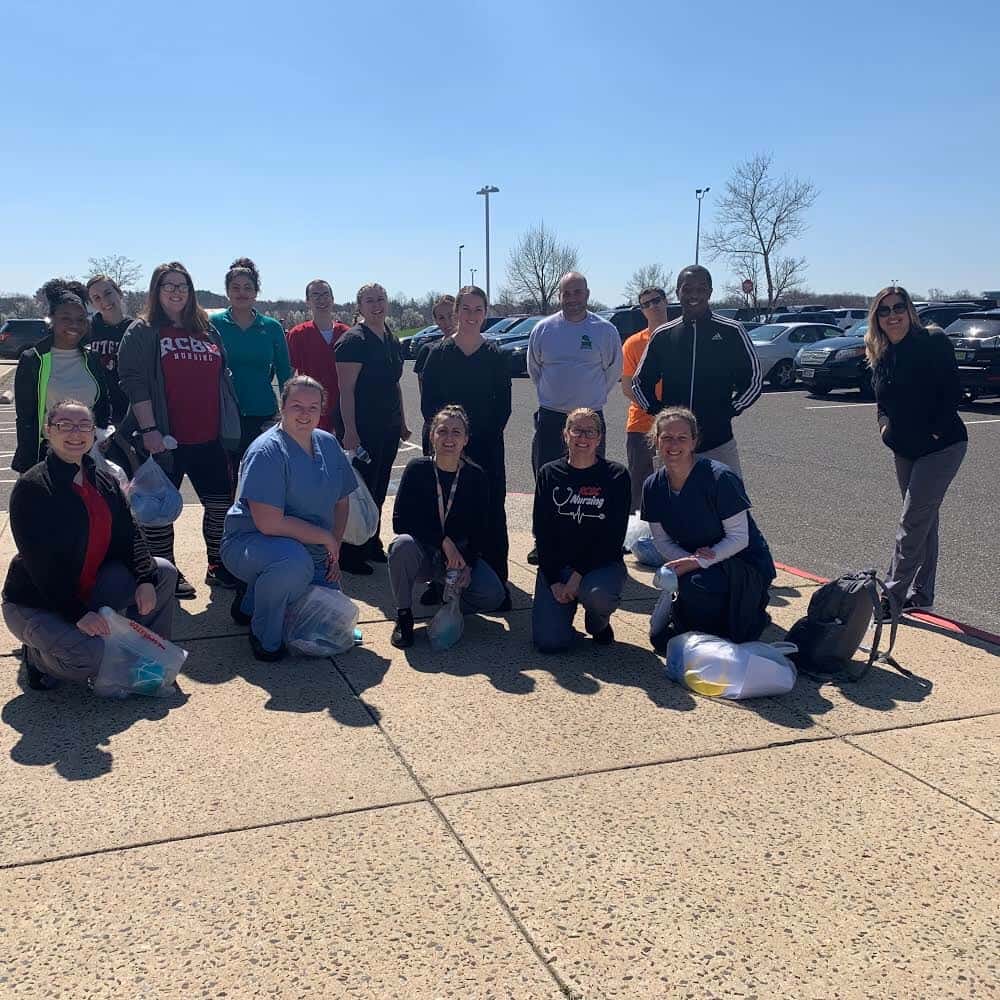

For some, it was a nurse in their youth whose wisdom and warmth softened a difficult time for nervous loved ones and grieving friends. Others have gravitated toward caregiver roles. And some “just always knew” that they were destined for the nursing profession.
No matter the path they took to enrolling as Rowan College at Burlington County (RCBC) nursing students, almost 20 of the school’s up-and-coming health professionals won’t just be able to talk about how the COVID-19 pandemic turned their lives upside down: They’ll be able to describe how they helped educate, diagnose and soothe Burlington County residents by fielding phone calls to its dedicated coronavirus hotline and administering tests to a worried public.
“At first, it’s pretty nerve wracking: People are coming in with symptoms and you don’t know what to expect,” says senior Lauren Bice, who works at the county’s testing center. “But in training, they taught us how to do the nasal-pharnyx swab and how to talk to people one on one.”
Weeks ago, dozens of students jumped at the chance to volunteer with the county’s coronavirus task force and at the testing site. With distinct but coordinated departments that have them working in tandem with not only their classmates but also the likes of law enforcement, EMS staff, county health department representatives and registered nurses, the students are doing everything from answering the COVID-19 hotline to administering the nasal swabs that result in a positive or negative coronavirus diagnosis.
“My study group and I were Facetiming when we got the email asking for volunteers and we were all like, of course we’ll do it,” says Nicole Pacitti, a junior in RCBC’s nursing program who works in the county’s call center. The Mt. Laurel resident adds that since the call for volunteer nursing students actually yielded more help than both the coronavirus task force and county testing center needed, she’s grateful to have a direct role in the countywide health initiative.
And even just days into their duties, it’s already making for the most hands-on classroom and lesson in bedside manner the nursing students ever had.
“The swab test is pretty uncomfortable: We have to get the swab pretty far back and it’s really uncomfortable, so people’s eyes start to tear up,” Bice explains. “But it’s pretty cool that we can be there for them already at this time when the community is in need of extra help. People are scared, and they appreciate us telling them what to expect and knowing that we’re here for them.”
“The first day, we were going to swab the first patient who came through, and I saw the look on this woman’s face. She had this look of fear and like she was so uncertain of what her results would be and what the future was going to hold for her,” recalls David Paul, a junior nursing student from Burlington City.
“I tried my best to smile through my mask and wave at her, and she kind of lit up. It reminded me that she’s a person, she’s a human being, and as human beings, we all should be here to help one another with whatever they’re going through.”
The experience is yielding lessons beyond a textbook education, too, like the importance of teamwork and how many people it takes to care for a community.
“It’s incredible seeing everyone come together when things are so scary,” says Pacitti.
“When you have a pandemic like this, the collaboration of a team is key,” adds Paul Sustek, a Marlton resident and senior nursing student. “You can’t do it alone: You need help from everybody.”
It also is allowing the students a firsthand, real-world opportunity to see just what kind of difference their chosen career allows them to make.
“Everyone’s so appreciative, and I just want to help,” says Bice. “It’s a really great feeling being able to help even before we can take the boards. It’s that excitement, that rush of first being nervous and then just putting ourselves out there to help.
“These aren’t great times, but it’s a blessing in disguise that we can help out and learn how to respond to an emergency situation firsthand.”
“You’re actually out in the field doing what nurses do, what we’re going to school for,” notes Sustek. “I was a little uncomfortable and concerned but it’s been great putting my nursing skills to work while comforting people who are scared. I welcome them to the process, I introduce myself, and I just give them the same care I would want my loved ones to get.”
And it’s not just a test of the students’ skills: It’s a testament to their dedication as nurses and caregivers in scary times.
“My whole family’s at home, so at first I felt selfish in a way for going out and breaking quarantine,” Pacitti says. “But it’s really worth it talking to these people who need some help. At the call center, I’m helping without exposing my family to something we still don’t know a whole lot about.”
“This is what we signed up for,” adds Paul. “I currently work in a hospital and you never know what kind of day you’re going to have as medical professionals. This is nursing, and you remember that people like Florence Nightingale rushed into situations they didn’t stop to think about.
“You get used to not being afraid, and you do whatever you can as soon as you get there.”









